Frank Rood - Trainer
The high tech industry is exciting and dynamic. But if you get the feeling that you are always one step behind the facts, that your work is never finished and you still take your stress from work home, then it’s high time to change the way you work. Frank Rood, as an experienced system architect and technical manager, knows exactly which obstacles you can come up against and how to overcome them within time management. He also draws richly from his own experience. ‘I have learned how to deal with every single pitfall that exist.’

Frank Rood (1968) knows time management and the high tech world through-and-through. ‘After completing my degree in mechanical engineering, with a specialisation in precision engineering technology, a course that nowadays falls under mechatronics, I have been involved in multidisciplinary electronics and software all my life. During the first ten years of my career, I was involved in product development within the semiconductor industry, including the development of machines and medical instruments. After my time as a systems architect and technical project manager, I became manager of a mechanical department. Later that post became more and more multidisciplinary, with combinations between hardware, software and process technology.’
Choose what you enjoy doing
As a manager, Rood started in 2000 with an impossible assignment. Besides managing a department with more than fifty employees, he also continued his work as a designer. This resulted in enormous time pressure, with the accompanying stress and bad time management. ‘In order to be able to combine these two roles, I started looking into time management. Then I discovered tools and resources to deal with my available time in a smarter manner. I immediately deployed those skills. In the end, I succeeded in both completing the project well and leading the department. Due to the skills that I learned. I liked the subject so much, that I shared my knowledge with colleagues and with the people I managed.
'Now I have the freedom to choose assignments that I enjoy, that I get energy from and that really have value for others.'
My last role as R & D director at Besi was very interesting in terms of content, but I didn’t like the accompanying politics at the top of the organisation. I realised that I came home much happier after a day during which I had trained or coached people how to deal better with their working hours. That is why in 2013 I started full-time with my own coaching company. Now I have the freedom to choose assignments that I enjoy, that I get energy from and that really have value for others. In doing so, I mainly focus on the technical sector. For example, I currently work together with a Swedish company in the field of modular architecture. In doing so, I have partly an advisory role and partly a role as an organisation coach to make their company and product more modular, and above all to teach them how to work in a different way.’
Consultation overkill
Rood has now transferred his knowledge and experience of time management into a training that is specifically aimed at product developers in the high tech world. Trainees learn the skills with which they actually get done the things that they themselves consider to be important. ‘For 25 years I have been on the shop floor of companies that develop products and during that time I have seen companies where things are really fantastic and the most beautiful things are being created. There have also been companies that have failed completely, companies in which incredibly intelligent, beautiful, smart, creative people did not come into their own. And that really hurts me. Because those failures happen at companies that are poorly organised or due to all sorts of external factors, and because people have to work in conditions where there are too many disruptions. And those disruptions are totally unnecessary.’
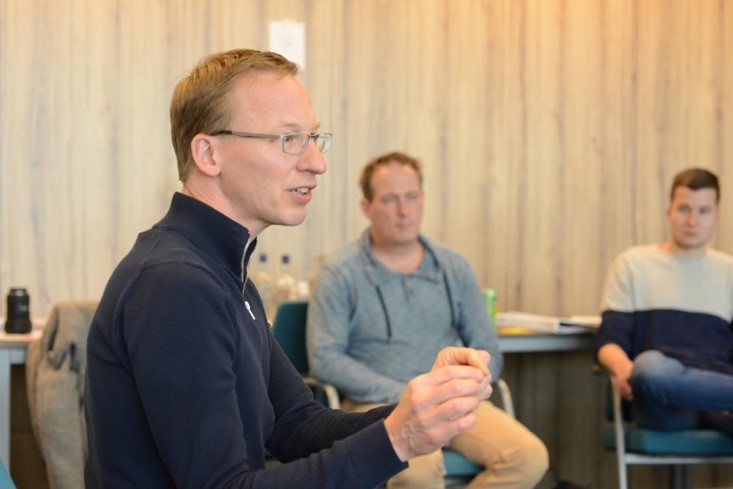
Due to an overkill of consultations and distractions by mail, apps or other means of communication People no longer have either the room, the time or the peace in which to do creative work. During his training, Frank discusses these problems with the participants and tells them how to solve them.
Rood refers to noisy office gardens, an overkill of consultations and distractions by mail, apps or other means of communication. ‘This kind of distraction is increasing. People no longer have either the room, the time or the peace in which to do creative work. And without that, the fantastic potential of all these brilliant people is lost. Because creativity only thrives when there is real peace and time in which to create products. When people are in a stressful situation, the prefrontal cortex no longer works, they don’t get new ideas. And if you are disturbed every ten minutes, you can never go deeply into your brain. Then you cannot write, and are unable to design or code software. Therefore I coach these people and these companies so that all their developers are in the right environments and have the skills with which they can really do their work.’
'It is all about managing all those external impulses in the right way, so that you can keep yourself busy with what you are hired for.'
Professionals often have difficulty with the tension between their actual work and the high intensity of their working environment. They are more concerned with day-to-day issues or their email than with their actual task. Or they find it difficult to say no to a colleague’s request. ‘It is all about managing all those external impulses in the right way, so that you can keep yourself busy with what you are hired for. If you don’t manage that well, you get stressed and if it really goes wrong, a burn-out. You need skills with which you can shield yourself without becoming a hermit.’
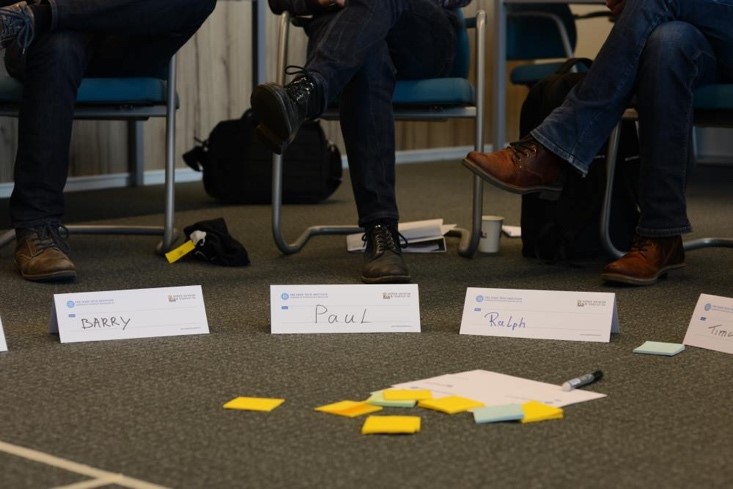
Sharing experiences on high work pressure is an important part of the time management training.
‘Saying no is particularly difficult, for example, because it is believed that the relationship with a colleague will suffer from a ‘no’ or that it will then become more difficult to ask the colleague for a favour. But those convictions usually turn out to be incorrect. ‘Don’t use too many words to say no, be clear in your message. It all starts by being clear to yourself about what your own goals are, what you really want to do. As soon as you know that, you can deal with impulses from your environment much more easily.’
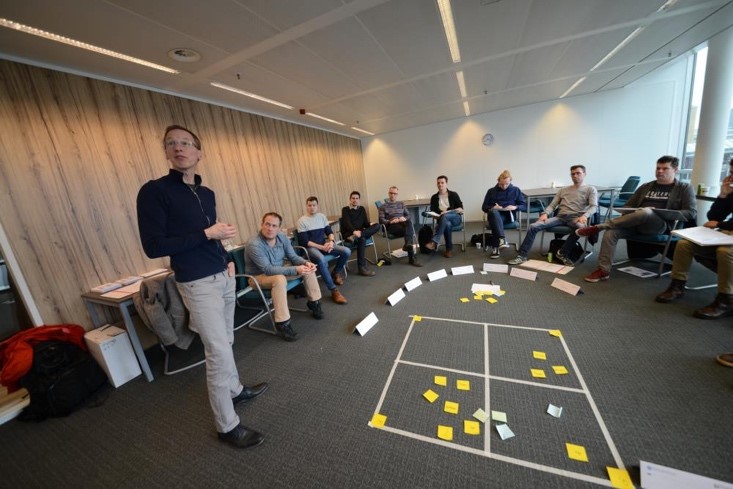
Frank Rood is fanatic with time management since he is super sensitive to stress and feels responsible. Especially perfectionist and people having diffuculties saying no are sensitive to become over-worked or even to have a burn-out. ‘I show all the characteristics of an average trainee and therefore I understand the technicians who come to these trainings so well. I know their job, I understand their working conditions and I have learned by trial and error to deal with it. In a short period of time, I can teach them all those things.’
Mono-tasking and dealing with disruptions
Rood’s training course starts with a whole day’s explanation of the theory behind time management when trainees can also practice with each other. ‘The theoretical basis is perfectly understandable, the problem lies in actually putting it into practice. Therefore, the first day we look at what is actually going wrong, where the problem lies and what it is that people want to achieve. Setting goals is crucial. Once you have identified your goal, you can make choices and determine which things have priority and which are unnecessary because they don’t contribute to your goal. Then we look at the tools and at the time management matrix. With this matrix you can determine what is important and urgent and how you can sort your tasks accordingly. We go into mono-tasking, the benefit of doing only one thing at a time and finishing it off. And how to deal with disruptions. We then make a plan so that people really know what they will do differently the next day at work. And they get a tool to help them keep their intentions: a buddy from the group or a colleague who helps with practice in the method over the following weeks. Because everything is aimed at getting people to work immediately with what they have learned. I phone them during the week to hear how things are progressing.’
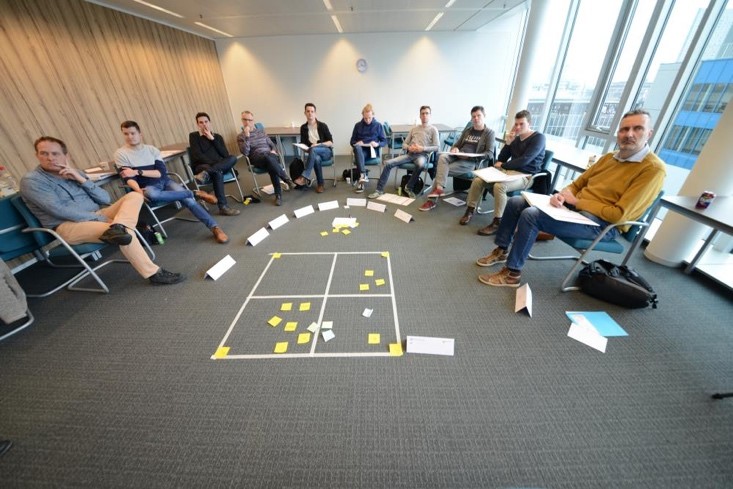
The quadrant with tasks and disruptions classified in order of importance and urgency, is a simple tool for setting priorities in your available time.
After three weeks, there is an additional half-day meeting, during which the trainees recount what has and has not succeeded. This feedback day forms the basis for the success of the training course. ‘Because the course participants know that they have to be accountable on the feedback day, they actually get to work. By the time we meet again, they have worked for over a month using new daily habits and structurally changing their behaviour. For example, they create a to-do list every morning or they permanently switch off email notifications. Some people ask me if I want to call them again four or six weeks after the training course, as reinforcement. Or they agree to meet with their buddy.’
'Immediately become more innovative and enjoy your work more.'
Three weeks after, participants come back for another half day of training. This half day is the basis for success since the participants feel their responsibility for being devoted. ‘By the time we see each other again, they have had one month in which they changed their daily habits and structural behaviour’ says lecturer Frank Rood.
A conscious choice
Also people who are heading towards a burn-out, have a burn-out or are just recovering from it, benefit from Rood’s training. Not least because he himself also suffered a burn-out. In that period he was manager at a department where, after a reorganisation, fewer people had to do exactly the same amount of work. ‘I felt bad about that reorganisation, where I had to send away a number of people. Everyone was then overstretched and due to a sense of responsibility to my employees I ended up trying to save them by partly taking over their work. That went fine for a long time, because I was strong and of course good at time management. My private environment did give alarm signals. For example, my partner asked if everything was alright, I noticed that I was so tired and sleeping badly and caught all sorts of ailments. But I ignored the signs, because in such a stress mode you are full of adrenaline and then you don’t see that things are going wrong.’
Rood collapsed on holiday. ‘Literally. I fell down and was unable to stand up anymore. It was quite shocking for someone who is quite a control freak to be completely out of control. Moreover, I felt extremely guilty: I finally had time to spend with my family and now I was just lying in my tent on my own…. Fortunately I was back on my feet after a few days.’
After that holiday, Rood changed course drastically. ‘Since then I have been running twice a week and I still do that. I started to slow down a lot and let things slide away from me more easily, I didn’t have to take on all the responsibility anymore. So I chose very consciously for my health and my family. And after that I went back to work fairly quickly, even though I went from almost sixty hours to forty hours a week. And I took a day off in between. That helped.’
Rood calls the loss of control, and a body that takes over, typical of a burn-out. ‘Your body understands that your head cannot handle it anymore and just stamps on the brakes. The trick is to recognise those symptoms the next time before your body takes over.’
He finds he himself the greatest enemy in this respect. ‘Why am I so fanatically involved with time management? I am super sensitive to stress, I feel very responsible, I am a perfectionist and relationship-oriented and I can hardly say no. So I show all the characteristics of the average trainee and have all the pitfalls within me. That’s why I understand the technicians who come to this training course so well. I know their work, I understand their working conditions and I learned to deal with them by trial and error. So they can learn all these things during the training course, in a short time.
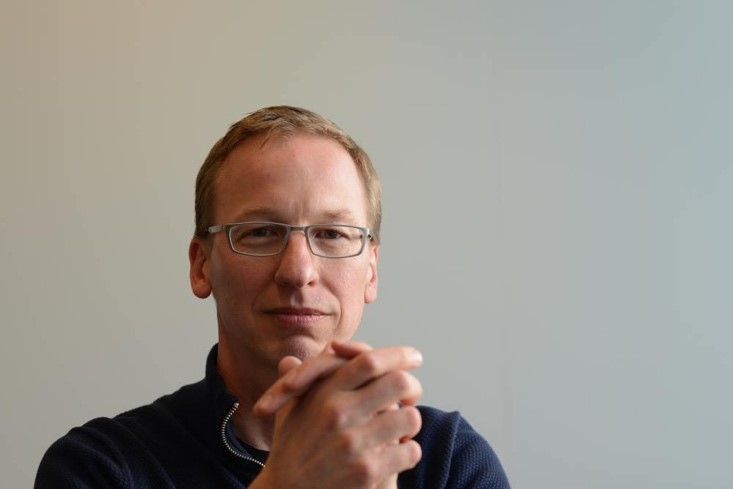
Frank Rood; ‘Failures come from bad organisation, several external facts and the fact that people have to deal with too many disruptions. Those disruptions are unnessecary.’
In addition to this skills training course, Rood also guides people on an individual basis, as a coach. In doing so, he goes into detail on deeply-set themes and convictions that form obstacles at work. ‘In addition, I also pay attention to nutrition and exercise. With people who are in the midst of a burnout or crisis, we first look at practical measures: how do you get more sleep? How are you looking after yourself? What kind of exercise are you doing? And what can you do at work? Only when that is working do we work on your convictions. Ultimately, the question is: at the end of your life, will you have done what you wanted to do? So that you don’t think on your deathbed: if only I had spent more time on my relationship, or I wish I had seen my children more or that I had made that trip. Because then it is too late. My biggest wish is that people don’t get in that situation. And that they can conclude that they have done the things they wanted to do, things that make sense of their existence.’
This article is written by Mathilde van Hulzen, tech editor of High-Tech Systems.

